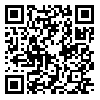Volume 3, Issue 6 (2017)
QHTS 2017, 3(6): 191-217 |
Back to browse issues page
Download citation:
BibTeX | RIS | EndNote | Medlars | ProCite | Reference Manager | RefWorks
Send citation to:



BibTeX | RIS | EndNote | Medlars | ProCite | Reference Manager | RefWorks
Send citation to:
Sultani A A, Moqadasi Nia M. A Study of Perlocutionary in Two Different Types of Commandments in Quran and Their Translations. QHTS 2017; 3 (6) :191-217
URL: http://qhts.modares.ac.ir/article-10-5849-en.html
URL: http://qhts.modares.ac.ir/article-10-5849-en.html
1- University of Qom
Abstract: (8630 Views)
This study is to explain the semantic and pragmatic functions of two different types of Quranic commandments: commandments in imperative mood and commandments in declarative mood. Based on a descriptive-analytical method, this paper studies such commandments through linguistic pragmatics and discourse analysis. The results show that both imperative and declarative sentences/ utterances are used to issue commands, but their usage results in specific inferences. The imperative form is used when the intended commandment pertains to a personal and/ or urgent situation, thus taking place in an interpersonal discourse situation. The declarative form, on the other hand, is used when the speaker does not intend to emphasize on the interpersonality and urgency of the command. The declarative form of command also shows the knowledge and certainty of the speaker with regard to the execution of the command. As a result, declarative forms are mostly used in contexts where the high status speaker is to impose his commandments, rules, and orders. When it comes to the translation of the Holly Quran, translators had different reactions towards the declarative commandments. In the case of verses pertaining to jurisprudential verdicts or cases where the command is explicitly stated, some have used “shall”. In some cases, too, they have not noticed the imperative mood, i.e. the existence of a commandment at all.
Keywords: declarative mood, imperative mood, linguistics of Quran, speech acts, translation of Quran
Received: 2016/03/31 | Accepted: 2017/02/8 | Published: 2017/02/16
| Rights and permissions | |
 |
This work is licensed under a Creative Commons Attribution-NonCommercial 4.0 International License. |







